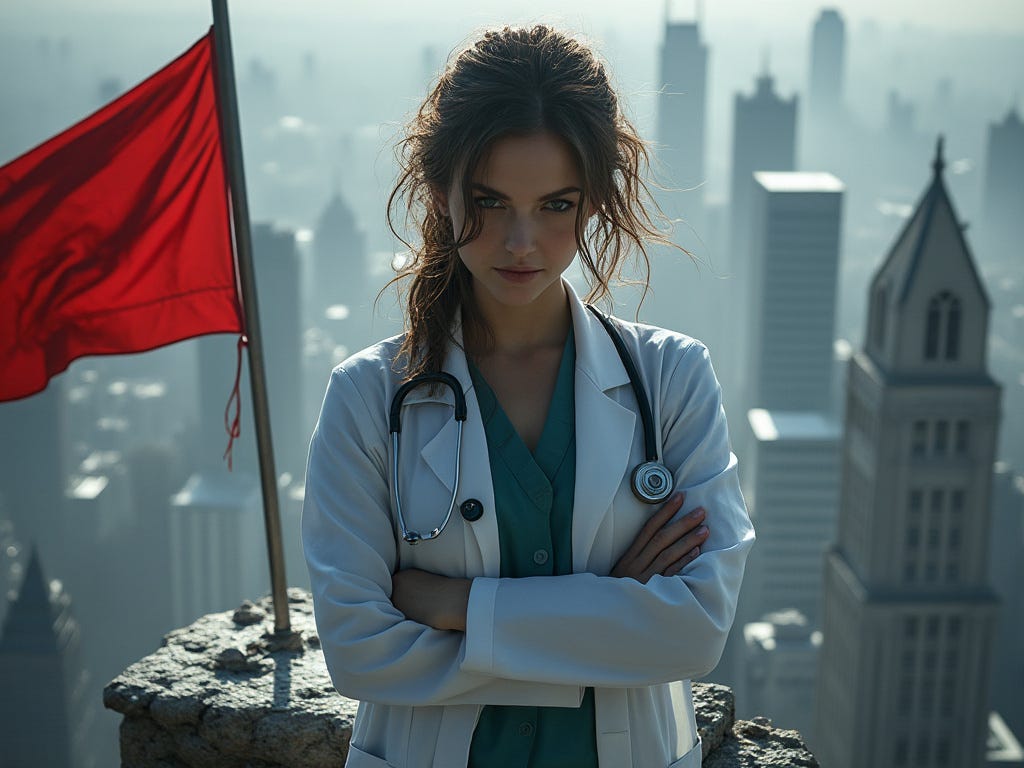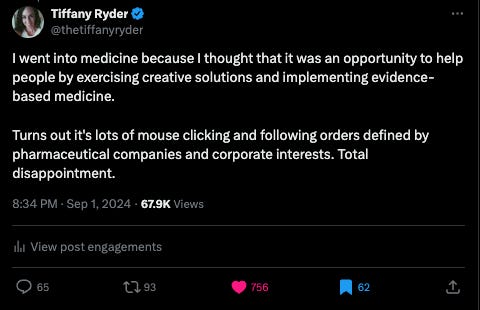Quit Asking Others to Decide and Do this instead.
NSAIDs, our kidney-killing friends get to profit off of the good of patients because the system lets them and no one's talking about it.
Accepting that YOU are responsible for saving yourself in order to prevent dying a miserable death engulfed in medical debt isn’t glamorous.
The reality seems dumb. Perhaps just sad. Or even terrifying.
Taking the ultimate responsibility for your health and your life isn’t easy. It’s the obvious next step and at the same time, it’s impossible.
I’ve been there, and I’d never been so scared.
And I’m not just talking about your ultimate physical death although many times that is exactly what’s on the line.
I’m also talking about the death of your career, your marriage, your friendships, your happiness and the hopes and dreams of all of things you might have been if you only understood how to better manage your mental or physical health.
What if instead of agreeing to play the helpless patient in the role you’ve been cast, you chose to pursue the death of a false narrative instead?
What if you killed off the idea of what healthcare is supposed to be (but isn’t).
It’s how I found true freedom.
And without accepting reality, I would have kept living in misery - vulnerable & dependent.
Afraid of being hurt because I didn’t know I could question my doctor.
Afraid of being called ‘crazy,’ ‘difficult’ or ‘non-compliant’ after a lifetime of trying obtain approval.
Afraid of being on the outside of a system I’d idolized my whole life and eventually spent $250,000 and over 8 years of school trying to work my way INto.
Afraid of… well, everything. Living out my worst nightmares.
The moment I came face-to-face with the idea I was unknowingly allowing the medical system to define the quality and length of MY life was when everything changed.
No one tells you you’re living in hell
I got lucky.
Hitting rock bottom left me no choice.
And once I realized that no one was coming to save me, I stepped up to the plate, but that’s a story for another day…
I know that I’m not the only one who wonders who and how medicine is supposed to ‘help’ any of us.
But apparently 68,000 of my Twitter BFFs (I mean ‘X BFFs’) are also disappointed.
And when see this type of response and I reflect on all of the times I’ve seen patients get hosed by the system - tricked into making choices with not enough (or misleading) information,
Big Pharma stands out in a class of their own.
It pays to be really good at things - chemistry, deception & trickery included.
But before we get started, let me be clear
I’m NOT anti-pharma.
Many, MANY lives have been saved by pharmaceutical products (prescription and over the counter) and there is absolutely a time and a place for medication in medical treatment.
What I AM saying very clearly is:
The “time and place” isn’t as often or as safe as you might have been led to believe
And that’s the point.
Because informed consent is ‘informed,’ right?
What I’m about to say might be surprising to you, but it will be less surprising if you remember that there are misaligned incentives at every turn. As Vinay Prasad points out in his essay, Unproven healthcare will bankrupt America,
Industry conferences are organized like pharmaceutical advertisements with money flowing from all the *wrong* places, and doctors paid handsomely to advocate for drugs in front of their peers.
“Patient advocacy groups” are funded by drug companies.
The FDA is a “revolving door” where government employees leave their posts for well-paid jobs at the same companies they used to regulate.
I digress.
But the correct assumption regarding any medication you currently think of as just ‘totally safe,’ is that it (likely) isn’t that simple. There’s more to the story.
Case in point? NSAIDs.
NSAIDs (which stands for ‘nonsteroidal anti-inflammatory drugs’) are super common meds used for everything from pain to fever. They come in over the counter versions (Advil/ibuprofen, Aleve/naproxen) and prescriptions like Toradol/ketoralac which is actually a favorite of mine in the ER.
We dose babies and the elderly, and we hardly ever talk about the risks.
If you can get it from the school nurse or Walgreens, could it really be so bad?
Consider this quote from John Robson I found in my research.
From the first day of use, all NSAIDs increase the risk of gastrointestinal (GI) bleeding, myocardial infarction, and stroke.
And, as it turns out, NSAIDs cause a large number of admissions due to “drug reactions’ - AND typically for super scary shit like heart attacks, stomach bleeding, strokes & kidney failure.
You’re likely familiar with the most famous NSAID of all, Vioxx (Merck), but just in case you’ve forgotten, they were the NSAIDs that have been estimated to have caused 88,000 heart attacks and 38,000 deaths in the early 2000s. I’ve heard much higher estimates but those are the numbers that were published in the Lancet.
You might also recall that both Merck and the FDA failed to acknowledge any of the big, loud waving Red Flags associated with the drug for over 5 years. Merck didn’t investigate or run appropriate trials of their own accord and the FDA refused to ask them to. All the while Merck spent millions dollars a year on “direct-to-consumer” advertising effectively disincentivizing the media from covering emerging problems associated with the drug while also making sure there was a line of patients at their doctor’s office waiting for it. Only when harms were practically undeniable was Vioxx finally “voluntarily withdrawn” from the market.
Pfizer’s molecularly similar compound from the same subclass, Celebrex, continues to be prescribed to patients in the US. I’ve never prescribed it myself and don’t know much more about it than what I learned in pharmacology.
But even if we exclude these two ‘exceptions,’ we’re still left with some disturbing data.
We know that whether based on dose (how much of the drug is taken), duration (how long the drug is taken for) or some other individual patient factors, we know that NSAID use WILL cause the following in some portion of the population -
Which begs the question of course…
Should YOU use them?
Well -
That’s part of a larger discussion,
And is totally and entirely up to you given their over-the-counter status.
But the fact that there are proven and significant risks associated with use, I would consider these 3 things.
Individuals respond uniquely to all medications (including NSAIDs), and we don’t know, what we don’t know. Ask your clinician or your pharmacist allllllll of the questions given your medical history and the symptoms you are trying to treat - maybe there’s a better option for you.
Treat NSAIDs like ‘real’ drugs that cause tens of thousands of adverse events like heart attacks, stomach bleeds, kidney problems…etc - because they are and they do.
Avoid unnecessary exposure to NSAIDs. My general rule of thumb for myself and my family is to take the lowest dose for the shorted possible length of time. As a point of reference, I even tell my healthy, low-risk ER patients that I’m discharging for an injury or something minor to not take them longer than 3 days without at least a call to their primary care.
And like anything, generally proceed with caution and run it by your pharmacist or primary care clinician.
Remember that pharmaceutical companies are corporations and therefore inherently do not have souls. There are serious risks even to totally healthy patients and there are likely *more* risks when you are sick or have chronic illness. A risk doesn’t mean that you will absolutely suffer damage from these drugs, but it does mean that you absolutely could and you should know that.
Is any of this new information for you? What did you find the most surprising? Let me know in the comments.
And if you found this interesting. Please forward it to a friend!
This is never medical advice, But I hope it gives you some things to think about.
Until next time,
Tiffany








Ooh this is very timely. I love a bit of chemistry and studied some neuropsychopharmacology during my course at uni.
Regardless, I had weird kidney results recently and the specialist told me to stay off NSAIDs for the reasons you've highlighted.
I have chronic pain too but don't take meds now unless it's really bad. had been on all sorts initially which was tough.
I'm very mindful now of finding other ways to pain manage where I can.